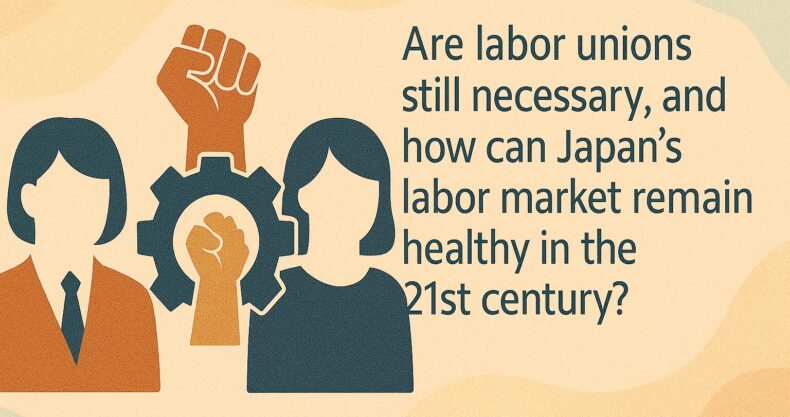トピック: Are labor unions still necessary, and how can Japan’s labor market remain healthy in the 21st century?
- 英語のみバージョン (English Only Version)
1.1. 必要である (Necessary – Affirmative View)
Introduction & Opinion
The topic is about the necessity of labor unions in Japan’s 21st-century labor market. I strongly believe that labor unions are still necessary to protect workers’ rights and ensure a healthy market.
Reason 1: Improving Working Conditions
First, labor unions are essential for improving working conditions. They negotiate with companies for better wages, shorter working hours, and safer environments. Without unions, individual workers have little power against large companies. For example, unions can fight against karoshi (death from overwork) by demanding stricter limits on overtime.
Reason 2: Protecting Non-Regular Workers
Second, unions are needed to protect non-regular workers. In Japan, the number of part-time and contract workers is increasing. These workers often have lower pay and fewer benefits than regular employees. Unions can help close this gap and ensure that all workers are treated fairly, which is key to a healthy and stable labor market in the 21st century.
Conclusion
In conclusion, labor unions are not a thing of the past. They are vital for protecting all workers and ensuring that Japan’s labor market remains healthy and fair in the face of new challenges.
1.2. 必要ではない (Not Necessary – Negative View)
Introduction & Opinion
The topic is about the necessity of labor unions in Japan’s 21st-century labor market. I believe that labor unions are no longer necessary because the market has changed, and they can sometimes harm the economy.
Reason 1: Protection by Law
First, workers are already protected by strong labor laws. The government has set minimum wages, safety standards, and rules for working hours. Therefore, the basic protection that unions once provided is now guaranteed by law. If a company breaks the law, workers can go to the government or a lawyer, not just the union.
Reason 2: Hindering Economic Growth
Second, unions can sometimes hinder economic growth and flexibility. They often resist changes that companies need to make to stay competitive, such as introducing new technology or changing work rules. In the fast-changing 21st-century economy, companies need to be flexible. Unions can slow down this process, which can hurt the company and the overall economy.
Conclusion
In conclusion, while unions were important in the past, they are no longer essential. A healthy labor market in the 21st century should focus on flexible work styles and strong government regulation, not old-style union power.
- 注釈付きバージョン (Annotated Version)
2.1. 必要である (Necessary – Affirmative View)
導入と意見 (Introduction & Opinion)
The topic is about the necessity (必要な) of labor unions (労働組合) in Japan’s 21st-century labor market (労働市場). I strongly believe that labor unions are still necessary to protect (守る) workers’ rights (労働者の権利) and ensure a healthy (健全な) market.
理由1: 労働条件の改善 (Improving Working Conditions)
First, labor unions are essential (不可欠な) for improving working conditions. They negotiate (交渉する) with companies for better wages (賃金), shorter working hours, and safer environments. Without unions, individual workers have little power against large companies. For example, unions can fight against karoshi (death from overwork) by demanding stricter limits on overtime (残業).
理由2: 非正規雇用の保護 (Protecting Non-Regular Workers)
Second, unions are needed to protect non-regular workers (非正規労働者). In Japan, the number of part-time and contract workers (契約社員) is increasing. These workers often have lower pay (低い賃金) and fewer benefits (少ない福利厚生) than regular employees. Unions can help close this gap (この格差を埋める) and ensure that all workers are treated fairly, which is key to a healthy and stable (安定した) labor market in the 21st century.
結論 (Conclusion)
In conclusion, labor unions are not a thing of the past. They are vital (極めて重要な) for protecting all workers and ensuring that Japan’s labor market remains healthy and fair in the face of new challenges.
2.2. 必要ではない (Not Necessary – Negative View)
導入と意見 (Introduction & Opinion)
The topic is about the necessity of labor unions in Japan’s 21st-century labor market. I believe that labor unions are no longer necessary because the market has changed, and they can sometimes harm the economy.
理由1: 法律による保護 (Protection by Law)
First, workers are already protected by strong labor laws. The government has set minimum wages, safety standards, and rules for working hours. Therefore, the basic protection that unions once provided is now guaranteed (保証されている) by law. If a company breaks the law, workers can go to the government or a lawyer, not just the union.
理由2: 経済成長の妨げ (Hindering Economic Growth)
Second, unions can sometimes hinder (妨げる) economic growth and flexibility (柔軟性). They often resist (抵抗する) changes that companies need to make to stay competitive (競争力のある), such as introducing new technology or changing work rules. In the fast-changing 21st-century economy, companies need to be flexible. Unions can slow down this process, which can hurt the company and the overall economy.
結論 (Conclusion)
In conclusion, while unions were important in the past, they are no longer essential. A healthy labor market in the 21st century should focus on flexible work styles and strong government regulation (規制), not old-style union power.
注釈リスト (Annotations List)
英語 (English) | 日本語訳 (Japanese Translation) |
labor unions | 労働組合 |
necessary | 必要な |
labor market | 労働市場 |
healthy | 健全な |
protect | 守る |
workers’ rights | 労働者の権利 |
essential | 不可欠な |
negotiate | 交渉する |
wages | 賃金 |
overtime | 残業 |
non-regular workers | 非正規労働者 |
contract workers | 契約社員 |
lower pay | 低い賃金 |
fewer benefits | 少ない福利厚生 |
close this gap | この格差を埋める |
stable | 安定した |
vital | 極めて重要な |
guaranteed | 保証されている |
hinder | 妨げる |
flexibility | 柔軟性 |
resist | 抵抗する |
competitive | 競争力のある |
regulation | 規制 |


















